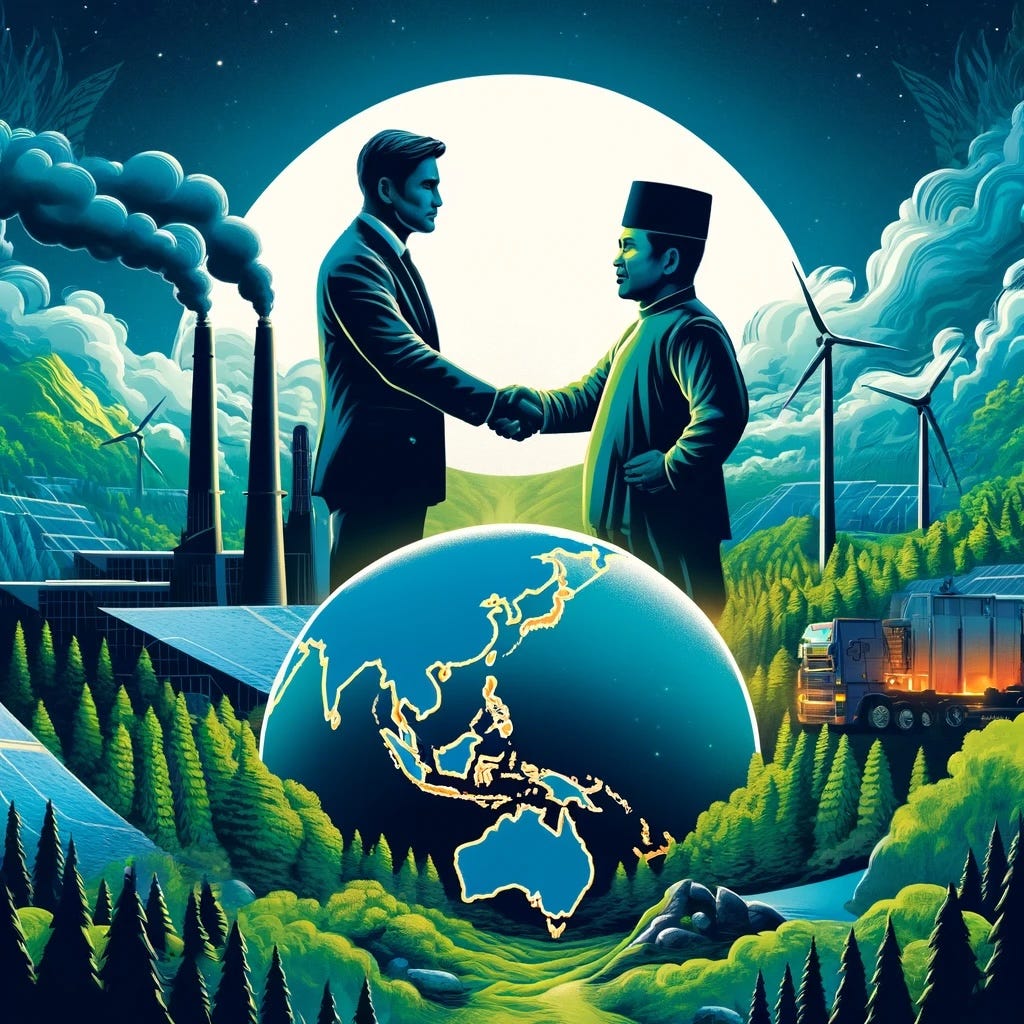Indonesia May Be Wasting Its Ties With China and Climate Partnership Full Potentials
Indonesia and China must reform their partnerships in critical minerals and form higher-quality partnerships in sectors that do not sacrifice the environment and the people.
We are still six months away from the official presidential inauguration. Still, China has already invited Indonesian President-elect Prabowo Subianto to visit Beijing to meet Chinese leader Xi Jinping in person. During the visit, Prabowo reiterated his promise to continue Jokowi’s development model, including partnerships with China.
Our close ties with China actually hold a lot of potential. Chinese Prime Minister Li Qiang said his country is keen to work together with Indonesia in agriculture, forestry, and fisheries and to expand cooperation in industry, high technology, poverty reduction, and rural revitalization. It sounds like opportunities for cooperation in climate issues are possible within a technological framework.
Environmental activists hope Indonesia can work more with China in the climate sector, particularly in the energy transition. Upon much international pressure, China has successfully begun to reform its energy policies and cut emissions. Center for Research on Energy and Clean Air (CREA), based in Helsinki, Finland, predicts that China’s emissions will decrease starting this year due to its massive renewable energy developments.
In 2022, China launched a series of green energy policies, including the acceleration of constructing a clean, low-carbon, safe, and highly efficient energy system while deepening mechanism reform and innovation in the energy sector. China will direct more national funds towards energy transition, and the state will facilitate the issuance of green bonds for companies in this sector.
Clear planning and strong fiscal and financial policies have supported China’s energy transition efforts. These achievements are certainly an aspiration for Indonesia, which could learn from China and follow in its footsteps to reduce dependence on fossil fuels.
Unfortunately, Prabowo may have wasted his recent visit. Rather than developing a true, deeper partnership with China on climate issues, the visit was a photo-op and a mere leverage chip that Prabowo could use against the West. At best, the visit could be seen as ensuring the continuity of Indonesia’s nickel supplies to China amid domestic and international criticisms.
Energy policies in Indonesia are closely linked to the economic and political interests of elites, who control nearly all fossil fuel interests – and Prabowo is a member of the elites.
According to data from Mining Advocacy Network (JATAM), an environmental NGO in Indonesia, Prabowo Subianto is an owner of coal companies Nusantara Energy and Nusantara Kaltim Coal. Nusantara Energy has a concession area of 4,793 hectares in Berau, East Kalimantan Province, while Nusantara Kaltim Coal has a coal mining concession covering 11,040 hectares in East Kutai Regency in the same province. In the election, Prabowo also received support from capital owners in the fossil energy sector, including the CEO of the coal company Adaro Energy, Garibaldi ‘Boy’ Thohir.
If Prabowo and his closest allies are part of the coal industry itself, could the people expect him to be serious about ending Indonesia’s dependence on dirty coal energy and get Indonesia to transition to renewable energy? The answer is it will be very challenging, if not impossible.
Furthermore, Indonesia’s energy policy may have taken a direction from the agenda of American fossil fuel companies instead.
In November last year, local media reported that President Jokowi met the CEO of ExxonMobil, one of the U.S.’ largest multinational oil and gas corporations. They discussed plans for decarbonization through the construction of a green petrochemical refinery and Carbon Capture Storage (CCS).
Climate activists have long rejected CCS as a climate solution, arguing that fossil fuel companies are using it to greenwash while expanding their operations and releasing millions of tons of carbon into the atmosphere with devastating consequences. In the U.S., most CCS projects have failed, and a 2021 study found that even among successful projects, 81 percent of the carbon captured was actually used to produce more fossil fuels.
In short, CCS is a technology that will extend the use of fossil energy. The longer fossil energy is used, the more difficult it will be for renewable energy to enter the market.
After meeting with Exxonmobil, President Jokowi issued a legal umbrella for CCS implementation in Indonesia. Prabowo, who has campaigned to continue Jokowi’s policies, has every political and personal reason to continue with CCS.
Indonesia should take some notes from China instead.
China successfully built its renewable energy thanks to the government’s strong political will, manifested in strong funding support and commitments towards research institutions working in the sector. That political will is less visible in Indonesia.
Indonesian leaders often tout our partnerships with China in processing critical minerals – particularly nickel for electric vehicle batteries – as part of our energy transition efforts. But in reality, our current critical minerals partnerships only benefit Indonesian and Chinese elites, with benefits and profits not trickling down to the average people.
Indonesia and China must reform their partnerships in critical minerals and form higher-quality partnerships in sectors that do not sacrifice the environment and the people. That is the real homework for the next president.
Firdaus Cahyadi is a longtime environmental consultant and a regular columnist for several of Indonesia’s largest news publications.
This article is free for Sinica subscribers. To get daily, agenda-free coverage exploring every aspect of China’s engagement with the Global South, subscribe to The China-Global South Project (CGSP).



